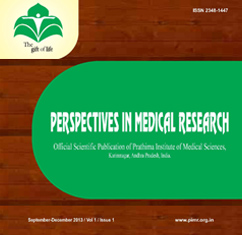
Original Article - Abstract
Year : January - April 2015 | Volume : 3 | Issue : 1 Page : 6 - 11
Gundigari Nagaraju1,Chennamaneni Vikas2, Ramesh T3, Apoorva Agrawal 4
1Postgraduate student, Department of Radiology, 2Associate Professor, Department of Radiology, 3Professor and Head, Department of Radiology, 4Postgraduate student, Department of Radiology, Prathima Institute of Medical Sciences, Karimnagar, Telangana, India.
Corresponding Author: Dr. Gundigari Nagaraju, Postgraduate Student, Department of Radiology, Prathima Institute of Medical Sciences, Karimnagar, Telangana, India
Email: [email protected].
Purpose:The purpose of this study was to examine the association between Coronary Artery Calcium (CAC) and Coronary Artery Disease (CAD); correlation between Coronary Artery Calcium Score (CACS) and Severity of Coronary Artery Stenosis as assessed by CT Coronary Artery Calcium and CT Coronary Angiography respectively, using a 128 slice CT scanner (PHILIPS: ingenuity) and also to determine the significance of zero CACS in safely excluding the CAD.
Materials and Methods:This study was approved by our institutional ethics committee and included 66 patients [41 men and 25 women] aged between 30 to 70 years and referred by physicians and recruited between April 2012 to February 2015. All patients had signed the written consent and underwent CT Coronary Artery Calcium and CT Coronary Angiography, for calcium scoring and coronary artery stenosis respectively. Patients who previously underwent stenting and bypass grafting were excluded. Also, patients with renal insufficiency (Serum Creatinine >1.5mg/dl) and patients having a history of contrast material allergy were excluded.
Results: : Out of 66 patients, 18.18% patients (n=12) were positive for CAD and 36.3% patients (n=24) were positive for CAC. Out of 24 patients with CAC positive, 50% (12) were having CAD and 50% (12) were negative for CAD and all patients with CAD were positive for CAC. Out of 42 patients with zero CAC, 42 patients (100%) were negative for CAD. Out of 16 patients with 1-100 CAC scores, 18.75% (3) were having mild CAD and rest were free from stenosis; and out of 4 patients with 101-400 CAC score 75% (3) were having moderate stenosis, 25% (n=1) were having severe stenosis and out of 4 patients with an above 401 CAC score, 75% (n=3) were having severe stenosis, 25% (n=1) were having moderate stenosis. The mean calcium score was higher in patients with stenosis than in patients without stenosis. [864.250 ± 440.8620 (severe stenosis); 385.125 ±154.0239 (moderate stenosis); 31.433±5.9282 (mild stenosis); 7.484± 1.0492 (no stenosis)]. The differences between the mean calcium values and severity of CAD was found to be statistically significant [f=96.488, P<0.001l].
Conclusion: In conclusion, we believe that CAC is significantly associated with presence of CAD and the degree of stenosis is also higher in high CACS patients. The patients with zero coronary artery calcium can be safely classified as very low risk for CAD.
Keywords :Coronary artery calcium, Coronary artery disease, CT coronary artery angiography

Open Access
Perspectives in Medical Research is committed to keeping research articles Open Access.Journal permits any users to read, download, copy, print, search, or link to the full texts of these articles...
Read more
